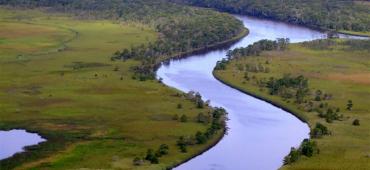
Albuquerque is a long way from Apalachicola.
But when a federal judge in the New Mexico city hears arguments next week in a long-running water war between Florida and Georgia, the small Panhandle community will be at the center of the case.
Senior U.S. Circuit Court of Appeals Judge Paul J. Kelly, appointed as a special master by the U.S. Supreme Court, will weigh whether Georgia uses too much water from a river system that flows into Apalachicola Bay.
Kelly’s ultimate recommendation to the Supreme Court could help determine whether Florida will be successful in its attempt to get a cap on Georgia’s water usage from the Apalachicola-Chattahoochee-Flint system --- an issue with high stakes for both sides.
“The Apalachicola region is one of the nation’s most unique, diverse, and irreplaceable environmental resources, and, until recently, home to one of its most iconic oyster fisheries,” Florida’s attorneys wrote in a January brief. “As Georgia has drastically increased its consumption of upstream waters, especially along the Flint River for agricultural purposes, the amount of water flowing into the Apalachicola has shrunk dramatically. This has had the predictable effect: The Apalachicola has suffered and its oyster fisheries, in particular, have collapsed. The question now is whether Georgia’s wasteful practices should be allowed to continue --- and worsen --- while the Apalachicola, its natural resources, and the communities that depend on them are decimated.”
But Georgia disputes that it uses too much water from the system and points to other factors such as droughts and decisions by the U.S. Army Corps of Engineers, which operates dams and reservoirs. Georgia attorneys argued in a January brief that Florida’s proposed cap on water usage would impose “enormous costs” on Georgia without “producing any material benefit to Florida.”
“Florida’s proposed cap would cost Georgia hundreds of millions --- if not billions --- of dollars,” the Georgia brief said. “At the same time, that cap would result in no meaningful benefits to Florida. Indeed, the costs the cap would impose on Georgia exceed the entire value of the industries and economies that Florida alleges have been harmed in this case --- let alone any incremental benefits the cap might provide those industries.”
Kelly, who serves on the 10th U.S. Circuit Court of Appeals, is scheduled to hear arguments Nov. 7 at a federal courthouse in Albuquerque. Kelly was appointed special master after a divided U.S. Supreme Court last year overturned a 2017 recommendation by another special master, Ralph Lancaster, who said Florida had not proven its case “by clear and convincing evidence” that imposing a cap on Georgia’s water use would benefit the Apalachicola River.
Writing for a 5-4 majority, Supreme Court Justice Stephen Breyer said Lancaster had “applied too strict a standard” in rejecting Florida’s claim.
Florida filed the lawsuit in 2013 and contends, in part, that water usage by farmers in Southwest Georgia has reduced water flows in the river system.
Key issues include whether Florida is entitled to an “equitable apportionment” of water and whether the potential benefits would outweigh the harms. In its January brief, Florida said it was seeking to cap Georgia’s consumptive use of water from the system at current levels until at least 2050, with the cap reduced during drought years.
“On the benefits side, a decree capping Georgia’s consumption would significantly increase the flow of water into the Apalachicola and restore the conditions in which the region survived and thrived for centuries,” Florida’s attorneys wrote. “And on the costs side, much of this reduction in consumption could be accomplished simply by halting wasteful irrigation practices and sensibly limiting future irrigation in ways Georgia officials have themselves proposed and other states (including Florida) have long implemented. The profound impacts of destroying a treasured ecosystem and natural resources that Florida, the federal government, and others have long sought to protect, and permanently altering the lives and livelihoods of the communities who rely upon these resources, clearly outweigh such costs.”
But Georgia contends the potential harms would outweigh the benefits and takes issue with one of Florida’s key arguments --- that a lack of freshwater flowing into Apalachicola Bay has damaged the area’s crucial oyster industry. Georgia attorneys wrote in January that the industry’s troubles stem from other issues, including actions taken by Florida after the Deepwater Horizon disaster in the Gulf of Mexico in 2010.
“Extreme oyster-harvesting pressures were a major cause of the 2012 collapse (of the oyster industry),” the Georgia brief said. “In the two years prior to the collapse, Florida removed restrictions on oyster harvesting out of concern that oil from the Deepwater Horizon spill might reach the bay and cause the fishery to be closed. Florida therefore adopted a ‘use it or lose it attitude’ toward oyster harvesting in the bay and allowed more oysters to be harvested in 2011 and 2012 than in any of the prior 25 years.”


